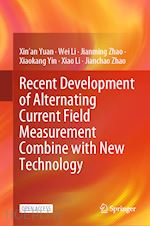
Questo prodotto usufruisce delle SPEDIZIONI GRATIS
selezionando l'opzione Corriere Veloce in fase di ordine.
Pagabile anche con Carta della cultura giovani e del merito, 18App Bonus Cultura e Carta del Docente
This open access book can be divided into three parts. In part 1, three articles are employed to introduce the RACFM technology. In part 2, two articles are introduced to explain the Multifrequency ACFM. In part 3, three articles are introduced to explain the visualization research in ACFM. With the development of ACFM detection technology, traditional single excitation frequency and single direction excitation structures cannot meet the requirements of multiple types of defect detection (such as cracks at different angles, and buried defects). New types of excitation structures and methods have been proposed, mainly including rotating electromagnetic field detection, multi-frequency detection, and defects visual algorithm. The changes in the excitation structure and signal mentioned above have expanded the scope of application of ACFM detection and provided opportunities for the cross-integration and innovation of ACFM detection technology with other advanced detection methods. This book mainly focuses on the study of the rotating alternating current field measurement (RACFM), the multifrequency ACFM, and the visualization method in ACFM.
Xin’an Yuan was born in Nanyang, China, on March 12,1990. He received the B.E., M.E., and Ph.D. degrees in mechanical design manufacture and automation from the China University of Petroleum (East China), Qingdao, China, in 2013,2016, and 2019, respectively. Following graduation, he joined the China University of Petroleum (East China), where he is currently an Associate Professor with the Research Institute of Center for Offshore Engineering and Safety Technology. His research interests include nondestructive testing, signal processing, and deep learning.
Wei Li (Member, IEEE) received the Ph.D. degree in mechanical and electronics engineering from the China University of Petroleum (East China), Qingdao, China, in 2007. Following graduation, he joined the China University of Petroleum (East China), where he is currently a Professor of mechanical and electronics engineering. His current research interests include electromagnetic nondestructive evaluation and signal processing, offshore engineering structure design and finite-element method analysis, and pipeline safety and reliability assessment.
Jianming Zhao received the Ph.D. degree in mechanical engineering in 2023 from the China University of Petroleum (East China), Qingdao, China. His research interests include signal processing, inversion imaging, and deep learning.
Xiaokang Yin (Senior Member, IEEE) received the B.E. degree in information engineering from the East China University of Science and Technology, Shanghai, China, in 2005, and the M.S. degree in advanced electronic engineering and the Ph.D. degree in engineering from the University of Warwick, Coventry, U.K., in 2007 and 2011, respectively. In 2011, he joined the China University of Petroleum (East China), Qingdao, China, where he is currently a Professor of mechanical and electronic engineering.
Xiao Li received the Ph.D. degree in mechanical engineering from the Dalian University of Technology, Dalian, China, in 2019. He is currently a Associate Professor with the China University of Petroleum (East China), Qingdao,China. His research interests include machine vision and contouring detection for machine tools. Jianchao Zhao received the B.E. degree from the China University of Petroleum (East China), Qingdao, China, in 2019, where he is currently pursuing the Ph.D. degree.,His research interests include model analysis.











Il sito utilizza cookie ed altri strumenti di tracciamento che raccolgono informazioni dal dispositivo dell’utente. Oltre ai cookie tecnici ed analitici aggregati, strettamente necessari per il funzionamento di questo sito web, previo consenso dell’utente possono essere installati cookie di profilazione e marketing e cookie dei social media. Cliccando su “Accetto tutti i cookie” saranno attivate tutte le categorie di cookie. Per accettare solo deterninate categorie di cookie, cliccare invece su “Impostazioni cookie”. Chiudendo il banner o continuando a navigare saranno installati solo cookie tecnici. Per maggiori dettagli, consultare la Cookie Policy.